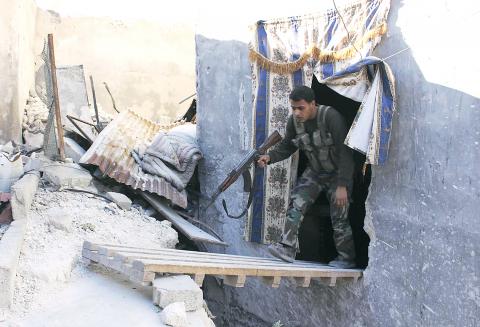Arab and Western powers met in London yesterday to push Syrian opposition leaders to attend talks in Geneva next month, but Syrian President Bashar al-Assad poured cold water on hopes of any peace deal.
British Foreign Secretary William Hague said the London meeting was aimed at persuading Syria’s fractious rebels to have a “united position” for the UN-backed conference in the Swiss city, scheduled for Nov. 23.
US Secretary of State John Kerry is at the talks along with Hague and counterparts from Egypt, France, Germany, Italy, Jordan, Qatar, Saudi Arabia, Turkey and the United Arab Emirates, together with opposition leaders.

Photo: Reuters
The Syrian National Council, a key member of the Syrian National Coalition, has already said it opposes the Geneva conference and threatened to quit the umbrella opposition group if al-Assad’s regime takes part in the Geneva 2 conference.
Opposition representatives are due to meet early next month to thrash out their differences.
“The longer this conflict goes on, the most sectarian it becomes and the more extremists are able to take hold,” Hague told BBC radio. “That is why we are making this renewed effort to get the Geneva peace process going.”
The US and Russia have been trying to organize the Geneva conference on the heels of the deal they reached for the destruction of Syria’s chemical weapons in the wake of a deadly poison gas attack in August.
However, al-Assad dealt an early blow to peace hopes, saying in an interview on Monday that he was willing to run for re-election next year and that the factors are not in place for the conference to succeed.
“No time has been set, and the factors are not yet in place if we want [Geneva 2] to succeed,” al-Assad told Lebanon-based pan-Arab satellite channel al-Mayadeen.
“Personally, I don’t see any reason why I shouldn’t run in the next election,” al-Assad said.

The US government has signed defense cooperation agreements with Japan and the Philippines to boost the deterrence capabilities of countries in the first island chain, a report by the National Security Bureau (NSB) showed. The main countries on the first island chain include the two nations and Taiwan. The bureau is to present the report at a meeting of the legislature’s Foreign Affairs and National Defense Committee tomorrow. The US military has deployed Typhon missile systems to Japan’s Yamaguchi Prefecture and Zambales province in the Philippines during their joint military exercises. It has also installed NMESIS anti-ship systems in Japan’s Okinawa

‘WIN-WIN’: The Philippines, and central and eastern European countries are important potential drone cooperation partners, Minister of Foreign Affairs Lin Chia-lung said Minister of Foreign Affairs Lin Chia-lung (林佳龍) in an interview published yesterday confirmed that there are joint ventures between Taiwan and Poland in the drone industry. Lin made the remark in an exclusive interview with the Chinese-language Liberty Times (the Taipei Times’ sister paper). The government-backed Taiwan Excellence Drone International Business Opportunities Alliance and the Polish Chamber of Unmanned Systems on Wednesday last week signed a memorandum of understanding in Poland to develop a “non-China” supply chain for drones and work together on key technologies. Asked if Taiwan prioritized Poland among central and eastern European countries in drone collaboration, Lin

ON ALERT: Taiwan’s partners would issue warnings if China attempted to use Interpol to target Taiwanese, and the global body has mechanisms to prevent it, an official said China has stationed two to four people specializing in Taiwan affairs at its embassies in several democratic countries to monitor and harass Taiwanese, actions that the host nations would not tolerate, National Security Bureau (NSB) Director-General Tsai Ming-yen (蔡明彥) said yesterday. Tsai made the comments at a meeting of the legislature’s Foreign Affairs and National Defense Committee, which asked him and Minister of National Defense Wellington Koo (顧立雄) to report on potential conflicts in the Taiwan Strait and military preparedness. Democratic Progressive Party (DPP) Legislator Michelle Lin (林楚茵) expressed concern that Beijing has posted personnel from China’s Taiwan Affairs Office to its

BACK TO WORK? Prosecutors said they are considering filing an appeal, while the Hsinchu City Government said it has applied for Ann Kao’s reinstatement as mayor The High Court yesterday found suspended Hsinchu mayor Ann Kao (高虹安) not guilty of embezzling assistant fees, reducing her sentence to six months in prison commutable to a fine from seven years and four months. The verdict acquitted Kao of the corruption charge, but found her guilty of causing a public official to commit document forgery. The High Prosecutors’ Office said it is reviewing the ruling and considering whether to file an appeal. The Taipei District Court in July last year sentenced Kao to seven years and four months in prison, along with a four-year deprivation of civil rights, for contravening the Anti-Corruption